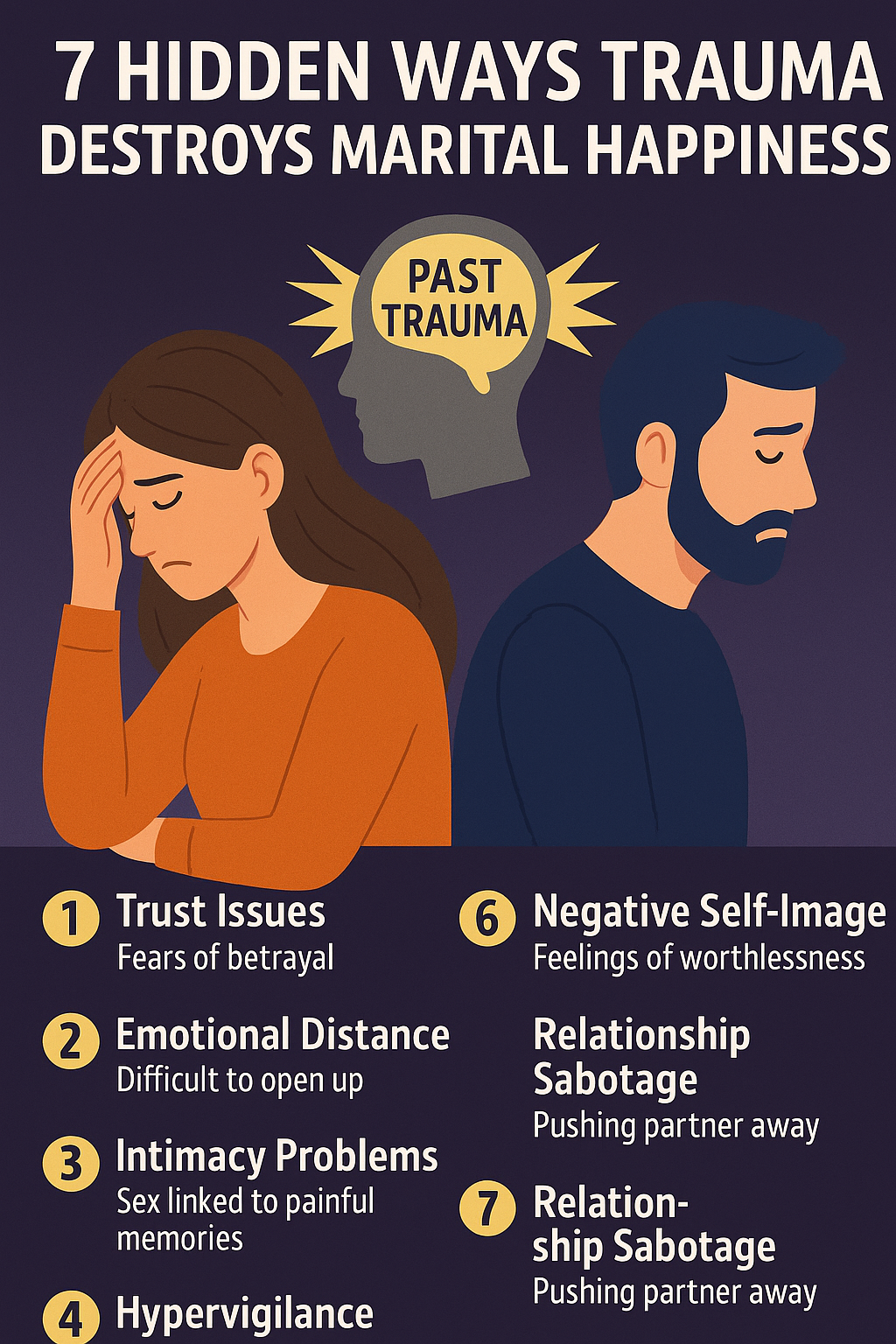
7 Devastating Effects of Trauma on Your Marriage: What You Must Know
Introduction: When the Past Trauma Enters the Present
Marriage is a partnership built on trust, vulnerability, and mutual growth. However, when one or both partners bring unresolved trauma from their past into the relationship, it can create invisible yet powerful obstacles to emotional intimacy and connection. Past life trauma—whether it stems from childhood neglect, abuse, loss, or earlier romantic relationships—has the potential to shape how individuals perceive love, respond to conflict, and connect with their spouse.
Understanding how past affects present marital life is essential not only for healing but for building resilient, emotionally secure relationships. In this article, we’ll explore the psychological impact of unresolved trauma, how it manifests in marriage, and the ways couples can address it together.
Understanding Past and Its Lingering Effects
It is not just a memory—it is an emotional and physiological imprint left on the mind and body. When left unprocessed, trauma can shape a person’s worldview, emotional responses, and interpersonal behaviors. Survivors often carry subconscious fears and defense mechanisms into adult relationships, which can influence the stability and health of a marriage.
Common sources of past pain include:
- Childhood abuse or neglect
- Parental divorce or abandonment
- Domestic violence
- Emotional invalidation
- Betrayal in previous relationships
These experiences can disrupt a person’s ability to form secure attachments and feel safe in emotional closeness.
Signs of Past Trauma in Marital Relationships
When past pain is unresolved, it often reveals itself in patterns that hinder the emotional bond between partners. Common signs include:
- Emotional Withdrawal: Individuals may struggle to express feelings or may become distant during emotional conversations, fearing vulnerability.
- Overreactive Conflict Responses: Trauma can trigger fight-or-flight responses, leading to intense arguments, defensiveness, or shutdowns during disagreements.
- Trust Issues: A partner who experienced betrayal or abandonment may find it difficult to trust fully, constantly seeking reassurance or suspecting infidelity.
- Fear of Intimacy: Physical or emotional closeness may feel threatening due to past violations of safety or boundaries.
- People-Pleasing or Controlling Behaviors: Trauma survivors may try to control situations to avoid unpredictability or become overly accommodating to avoid conflict.
These behaviors can create cycles of misunderstanding and emotional distance, weakening the marital bond over time.
Psychological Impact on Marital Life
Unresolved trauma can act as an invisible third party in a marriage, influencing every aspect of the couple’s dynamic. From communication breakdowns to emotional unavailability, the psychological effects can be profound:
- Hypervigilance: Trauma survivors may constantly anticipate danger or rejection, misinterpreting neutral actions as threats.
- Low self-esteem: Past trauma often distorts self-worth, leading individuals to feel undeserving of love or support.
- Projection: Unresolved emotions may be projected onto a partner, causing unfair accusations or assumptions.
- Avoidant communication: Difficult emotions may be suppressed to avoid confrontation, which results in unmet emotional needs.
Impact on Intimacy and Sexual Life
Trauma—especially involving past abuse or boundary violations—can deeply affect sexual intimacy. A partner may avoid physical closeness, experience dissociation during intimacy, or feel unsafe in sexual vulnerability. The other partner may feel rejected or confused, leading to frustration and feelings of isolation.
This creates a feedback loop where emotional and physical disconnect reinforce each other, diminishing the relationship’s strength.
Effect on Parenting and Family Life
If couples with unresolved trauma become parents, the emotional residue may affect their parenting style. For example:
- A partner with a traumatic childhood may become overprotective or emotionally distant.
- Unresolved anger may surface in moments of stress, affecting children’s emotional safety.
- Emotional regulation issues can disrupt consistent discipline or empathy.
Moreover, children may internalize these behaviors, potentially continuing a cycle of emotional pain and disconnection.
Steps Toward Healing in the Marital Context
While trauma casts a long shadow, healing is possible—especially when both partners commit to understanding and growth. Here are ways couples can begin the healing process:
- Open Communication: Establish a safe space for honest, non-judgmental sharing of experiences and feelings.
- Trauma-Informed Couples Therapy: Working with a professional helps identify patterns rooted in trauma and develop healthier ways of connecting.
- Individual Therapy: Personal healing often needs one-on-one attention to process specific events and triggers.
- Emotional Literacy: Learning to recognize and label emotions allows for better communication and reduces reactivity.
- Practicing Patience and Compassion: Healing takes time. Partners should support each other through setbacks without blame.
Conclusion: Breaking the Cycle of Pain
Marriage can either amplify unresolved wounds or offer a safe space for healing. By recognizing how past trauma affects present marital life, couples can interrupt generational patterns and nurture deeper emotional security. Emotional awareness, empathy, and therapeutic support can transform pain into partnership, helping both individuals grow—together and individually.
Whether you or your partner carry past life trauma, remember: healing is not only possible—it’s essential for a fulfilling, connected life together.
Consult a Psychologist: Get professional help

